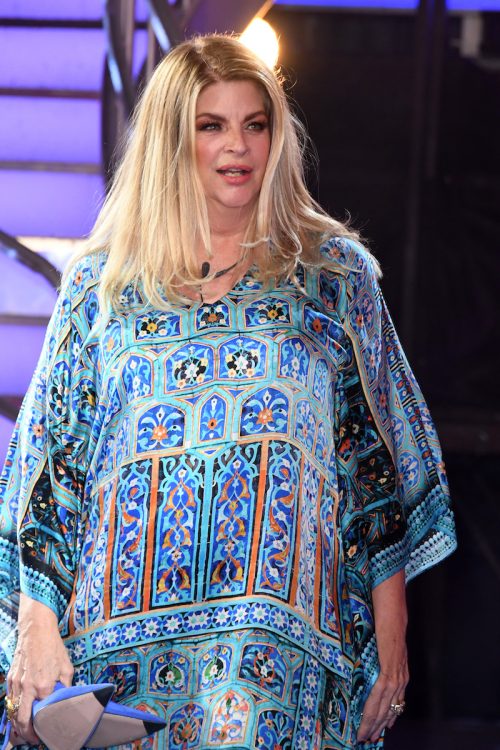Leah Remini Suggests Scientology Could Be Partly to Blame for Kirstie Alley’s Death

On Monday, Dec. 5, Kirstie Alley’s children shared the news that the actor had died following a short battle with colon cancer. Known for her roles in the series Cheers and Veronica’s Closet and the movies Look Who’s Talking and Drop Dead Gorgeous, she was 71 years old. Alley’s children, True and Lillie Stevenson, said in their statement that their mother’s cancer was “only recently discovered” and thanked the nurses and doctors who treated her. But, commenting on the news of the star’s death, former Scientologist Leah Remini raised a concern about the way Alley’s religion views illness.
Remini and Alley were publicly at odds over for years because of their ties to Scientology. Alley was a longtime member of the church when she died, while Remini is a former member who has been very outspoken against the religion, including writing the book Troublemaker: Surviving Hollywood and Scientology and producing the docuseries Leah Remini: Scientology and the Aftermath. Here’s what Remini had to say about the Cheers star’s passing and why she believes Scientology can have a negative impact on members battling health issues.
READ THIS NEXT: The Biggest Celebrities Who’ve Left Scientology.
Alley’s children released a statement about her passing.

In a statement to People, 30-year-old True and 28-year-old Lillie announced that Alley had died.
“We are sad to inform you that our incredible, fierce and loving mother has passed away after a battle with cancer, only recently discovered,” they said. “She was surrounded by her closest family and fought with great strength, leaving us with a certainty of her never-ending joy of living and whatever adventures lie ahead. As iconic as she was on screen, she was an even more amazing mother and grandmother.”
They also thanked the “incredible team of doctors and nurses” at Moffitt Cancer Center for caring for their mom.
Remini brought up a concern about Scientology and physical health.

Remini spoke to Rolling Stone for an article about Alley’s devotion to Scientology. “The news of Kirstie Alley’s passing is very sad,” the King of Queens star said.
The article notes that Scientology founder L. Ron Hubbard was critical of western medicine and that Scientologists often seek alternative treatments for ailments. Remini commented on the possible connection between these beliefs and Alley’s death.
“While it has been reported that Kirstie sought conventional cancer treatment, which gave her a fighting chance, the majority of Scientologists do not seek treatment until it’s too late,” Remini told Rolling Stone. “Scientologists are convinced they can cure themselves of diseases like cancer. It’s one of the more sinister things they promise. And because Scientology claims to be an exact science, not a faith, its members are brainwashed into believing these false claims as guarantees.”
For more celebrity news delivered right to your inbox, sign up for our daily newsletter.
Alley once called Remini a “bigot.”

During a 2013 appearance on The Howard Stern Show, soon after Remini began speaking out against Scientology, Alley said of Remini, “She’s a bigot.”
As reported by HuffPost, the Veronica’s Closet actor went on to say, “When you are generalizing, and when your goal is to malign and to say things about an entire group—there are tens of millions of Scientologists in the world—when you decide to blanket statement, ‘Scientology is evil,’ you are my enemy.”
In her own interview with Howard Stern in 2015 (via New York Daily News), Remini said she understood Alley’s comments about her and why she blocked her on Twitter. “That’s, again, very understandable because that is the policy,” Remini explained. “You’re supposed to disconnect from anybody who’s antagonistic to what you’re doing in your life.” (CNN has reported that the number of Scientologists in the world is likely in the hundreds of thousands rather than the millions.)
Scientology’s views on treatment have also come to light through other celebrity stories.

Through other famous members, Scientology’s teachings on psychiatric and medial treatment have been made public. Most famously, Scientologist Tom Cruise criticized Brooke Shields for taking antidepressant medication for postpartum depression during a Today show interview in 2005. He also called psychiatry a “pseudoscience.” Scientology’s position is that psychiatry is a form of abuse and not a valid field.
In 2009, when John Travolta’s son, Jett Travolta, died at age 16 after suffering a seizure and hitting his head on a bathtub, there was speculation over whether Scientology played a role in terms of Jett not being properly treated. Travolta later credited the church with helping his family through the tragedy. “The church never left our sides for two years,” he told Us Weekly in 2019. “I don’t know if I would have made it through without their support.”
The official Scientology website has a section about medical care, which reads, “Scientologists seek conventional medical treatment for illnesses and injuries. Scientologists use prescription drugs when physically ill and also rely on the advice and treatment of physicians. The Church of Scientology has always had the firm policy of not diagnosing or treating the sick.”